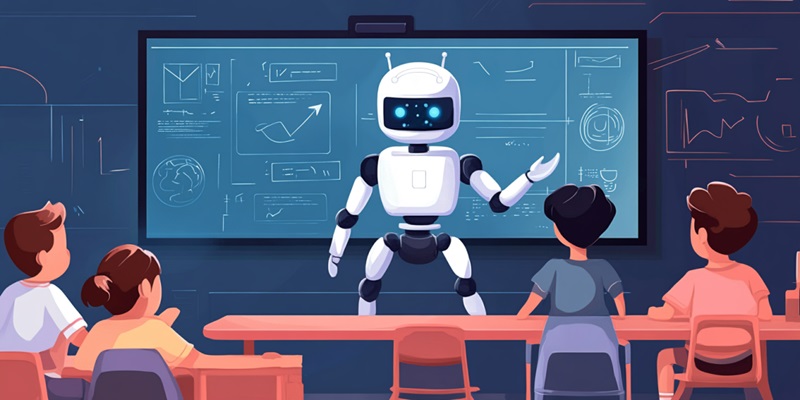Education is undergoing a transformation, driven by the rapid integration of artificial intelligence (AI) into classrooms. Among the most promising tools revolutionizing this sector is Microsoft’s Education Copilot. Designed to support educators in managing their workloads, engaging students, and personalizing learning experiences, this advanced AI assistant aims to reshape the educational landscape.
The Growing Presence of AI in Education
AI: A New Era in Teaching
Artificial Intelligence is no longer a futuristic concept; it’s becoming an essential component of modern education. AI tools, like Microsoft’s Education Copilot, are now instrumental in performing various educational tasks that were previously time-consuming for teachers. This integration signals a shift towards more technologically sophisticated and efficient educational environments.
Streamlining Administrative Tasks
One of the significant benefits of AI integration in education is the automation of administrative tasks. Traditionally, activities such as lesson planning, grading, and record-keeping have consumed a considerable amount of teachers’ time and energy. Education Copilot automates these processes, allowing educators to dedicate more time and resources to interactive and personalized teaching. This not only increases efficiency but also enhances the overall classroom experience for students.
Personalized Learning Through Data
The use of AI in education extends beyond administrative efficiency. Tools like Education Copilot leverage data to tailor learning experiences to individual student needs. By analyzing student performance and learning styles, AI helps in creating personalized pathways that cater specifically to each learner, ensuring that no student is left behind.
Core Features of Education Copilot
Automated Lesson Planning for Effective Teaching
Education Copilot is equipped with features that streamline lesson planning. By aligning proposed lesson plans with curriculum standards and using student performance data, the AI assistant suggests individualized learning paths. This ensures that every lesson is both compliant with educational requirements and tailored to effectively address the students’ unique needs.
Intelligent Grading and Feedback
The grading process can be daunting, but Education Copilot makes it easier by automating assessments. Using advanced algorithms, the AI assistant provides immediate feedback, pinpointing areas where students excel or struggle. This instant insight allows teachers to adjust their approaches and offer additional support where needed, fostering a more dynamic and responsive teaching environment.
Enhancing Engagement and Collaboration
Engagement is critical in effective learning, and Education Copilot promotes this through its interactive features. By facilitating group discussions, suggesting collaborative projects, and providing real-time interactive tools, the AI assistant keeps students actively involved in their learning journey. This collaboration not only nurtures critical thinking and problem-solving skills but also builds a stronger sense of community within the classroom.
Impact on Educators
Alleviating Workload
One of the most significant impacts of Education Copilot on teachers is the reduction of their workload. By handling routine and repetitive tasks, the AI assistant allows educators to focus more on direct student interaction and high-quality instructional activities. This balance enhances job satisfaction and enables more creativity and effectiveness in teaching methods.
Data-Driven Decision Making
Education Copilot provides teachers with in-depth data-driven insights into student performance and learning trends. These insights allow educators to make informed decisions about instructional approaches and interventions. By identifying common challenges and monitoring progress consistently, teachers can adapt their strategies to meet each student’s needs more effectively.
Preparing Teachers for Technological Advancements
Adopting AI in education requires teachers to develop new competencies and adapt to evolving technological tools. Education Copilot plays a role in easing this transition by offering user-friendly interfaces and intuitive functionalities. This support helps educators become more comfortable with technology, encouraging them to embrace further innovations in their teaching practices.
Future Prospects of AI in Education
Continuous Advancements in AI Education Tools
The adoption of AI tools like Education Copilot marks just the beginning of a more technologically integrated educational system. As AI continues to evolve, future advancements are expected to offer even more sophisticated solutions to critical issues in teaching and learning. These developments promise to enhance educational outcomes by providing more precise and effective tools for educators and learners alike.
Bridging Gaps in Education
AI holds the potential to bridge gaps in education by providing equal learning opportunities for all students. Education Copilot’s ability to personalize learning ensures that underperforming students receive the support they need, while high achievers are continually challenged. This democratization of education resources can help create a more inclusive and equitable educational system, addressing diverse needs in a meaningful way.
The Role of Educators in an AI-Driven Future
While AI tools like Education Copilot offer numerous benefits, the human touch remains irreplaceable in education. The future of education likely involves a collaboration between educators and AI, where teachers oversee and guide the learning process, using AI to complement their efforts. This synergy between human expertise and AI-driven efficiencies holds promise for a more robust and adaptive educational system.
Conclusion
Education is experiencing a significant transformation thanks to the rapid adoption of artificial intelligence (AI) in classrooms. One of the standout tools at the forefront of this change is Microsoft’s Education Copilot. This advanced AI assistant is designed specifically to assist educators in various aspects of their roles, ultimately reshaping the educational landscape.
Microsoft’s Education Copilot offers a range of capabilities aimed at streamlining teachers’ workloads, allowing them to spend less time on administrative tasks and focus more on student engagement and instruction. By handling repetitive tasks, the AI assistant frees up valuable time for educators, enabling them to develop more meaningful connections with their students.
Furthermore, Education Copilot enhances student engagement through personalized learning experiences. The AI can tailor educational content to meet the unique needs and learning styles of individual students, ensuring a more impactful and effective learning journey. This level of customization helps keep students motivated and invested in their education, ultimately leading to better academic outcomes.
In conclusion, the integration of AI tools like Microsoft’s Education Copilot is set to revolutionize the education sector. By assisting educators in managing their workloads, keeping students engaged, and offering personalized learning experiences, this technology is paving the way for a smarter and more efficient educational environment.

